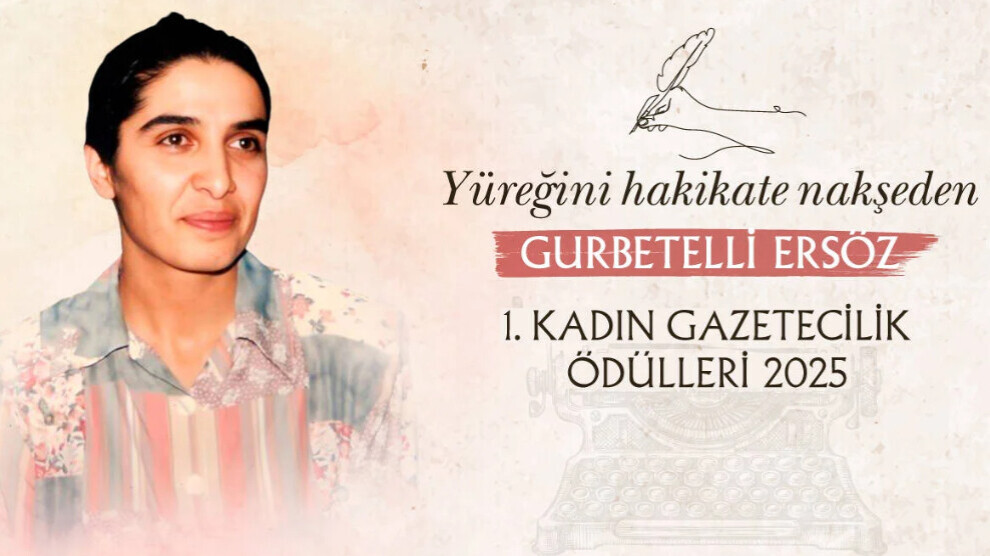Gurbetelli Ersöz Women’s Journalism Awards: Honor Struggle, Preserve Legacy
The late journalist Gurbetelli Ersöz inspires a new generation. For the first time, the “Gurbetelli Ersöz Women’s Journalism Awards” offer female journalists hope and a renewed commitment to pursuing the truth.

ARJÎN DILEK ÖNCEL
Amed (Diyarbakır) – Applications are currently open for the inaugural “Gurbetelli Ersöz Women’s Journalism Awards,” organized by the Mesopotamia Women Journalists Association (MKG). The awards honor the late Ersöz, the first female editor-in-chief in the history of Turkish journalism, and commemorate female journalists who have lost their lives pursuing truth and peace.
Born in 1965 in the village of Akbulut, near Elezîz (Elazığ) in Northern Kurdistan, Ersöz initially studied chemistry and pursued a master’s in environmental energy studies. Her life path changed after the chemical attack on Halabja, leading her to academia before being arrested in 1990 for alleged affiliation with the Kurdish liberation movement and enduring torture. Ersöz later became a symbol of women’s struggle and press freedom in Kurdistan.
Applications opened on June 17 and will remain open until September 28. Awards will be granted in four categories: Kurdish news reporting, Turkish news reporting, photography, and video journalism. Winners will be announced on October 6, and the awards ceremony will be held on October 8, commemorating the legacy of the late journalist Gurbetelli Ersöz.
Recognizing courage, solidarity
Roza Metina, president of MKG, and Midya Bal, editor at Welat Agency, highlighted the importance of the awards. Both called on women journalists worldwide to participate, noting that the competition aims to strengthen solidarity and make the contributions of female reporters more visible.
Rosa Metina highlighted that the founding of the Mesopotamia Women Journalists Association (MKG) coincides with the anniversary of the death of the first female editor-in-chief, Gurbetelli Ersöz. She said the association was launched to give a voice to all oppressed female journalists, emphasizing their struggle to make women’s work visible in the media sector.
Honoring Gurbetelli Ersöz
Metina explained that MKG, established in 2023, is organizing for the first time a competition commemorating Ersöz’s pioneering journalism, ensuring her contributions are remembered.
She added: “The Gurbetelli Ersöz Women’s Journalism Awards are crucial for encouraging female journalists and defending their work. This inaugural edition comes at a time when journalists face constant attacks, making their efforts more visible. While this is the first edition, it will gain true significance through active participation.”
Inviting female journalists to take part, Metina said: “Our call is open to all women, wherever they are. By submitting their work, they help strengthen our unity and collectively defend our efforts.”
Inspiring hope amid challenges
Midya Bal emphasized that the awards showcase the determination of women journalists. “Through decades of struggle, women in journalism have proven their strength and perseverance,” she said. “Despite immense pressure, we have reached a point where we can honor colleagues and inspire hope for the future.”
She highlighted the historic marginalization of women in male-dominated societies, noting that Kurdish women have faced double oppression—both as women and as members of a marginalized ethnic community. “Kurdish women have resisted and achieved progress, with free press playing a vital role in this struggle,” she said.
‘The competition demonstrates how the struggle has grown’
Midya Bal said that journalists in the field of independent media strive to amplify the voices of their communities and the oppressed worldwide. She described Gurbetelli Ersöz as a prominent figure in this field: “She was a chemist, journalist, and activist, serving as a role model for women. She was not only a pioneering thinker but also someone who turned ideas into action. This competition demonstrates how the struggle has grown from yesterday to today—it has never retreated, only advanced.”
Bal added: “This competition is a response by female journalists to all forms of oppression, death threats, and torture. It says: ‘We are still here; the world now knows of our existence.’ The Kurdish struggle was about protecting their people, but women fought for their identity as Kurds and as women. Journalists following in Gurbetelli Ersöz’s footsteps are answering the pressures they face.”
A global message of solidarity
Bal underscored that the awards send a strong message to women worldwide. “They offer hope and courage to future generations. The Kurdish journalists’ struggle resonates globally, influencing movements in Afghanistan, India, and Africa. Solidarity among women journalists worldwide is essential and can create significant change.”
She concluded with an invitation to young journalists: “Join us to expand this struggle and become part of a free press that amplifies the ongoing fight for justice and visibility.”
